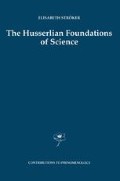Abstract
I. The phrase “descriptive phenomenology” might seem like a pleonasm, since there is no phenomenology that claims to proceed in any other than a descriptive way. Nevertheless, all phenomenologists emphasize the attribute “descriptive,” and at the beginning of our considerations it may be helpful to focus upon what they mean by it.
Access this chapter
Tax calculation will be finalised at checkout
Purchases are for personal use only
Preview
Unable to display preview. Download preview PDF.
Reference
See Alfred Kastil, Die Philosophie Franz Brentanos (Bern: A. Francke Verlag, 1951), and
Oskar Kraus, Franz Brentano (München: Beck, 1919). This book includes a contribution by.
Edmund Husserl: “Erinnerungen an Franz Brentano,” 153-167, and also a list of Brentano’s publications during his lifetime. English translation, “Reminiscences of Franz Brentano,” in The Philosophy of Brentano, ed. Linda L. McAlister (London: C. Duckworth, 1976), 47–56.
Ernst Mach, Beiträge zur Analyse der Empfindungen (Jena, 1886). Later editions with the title: Die Analyse der Empfindungen und das Verhältnis des Physischen zum Psychischen, 9th ed., Jena 1922. For the relations between Brentano, Mach, and Husserl in a short survey see Elisabeth Ströker, “Die Philosophie Edmund Husserls. Vorbedingungen, Ausarbeitung, Wirkungen,” in: Elisabeth Ströker and Paul Janssen, Phänomenologische Philosophie, (Freiburg/München: Karl Alber Verlag, 1989), 21ff.
Edmund Husserl, “Philosophie als strenge Wissenschaft,” Logos I, 1910–11, 289–341. (Reprinted Frankfurt am Main: Vittorio Klostermann, 1965 and 1981, and now in Hua XXV, 4-62). English translation.
Edmund Husserl “Philosophy as Rigorous Science,” in: Edmund Husserl, Phenomenology and the Crisis of Philosophy, trans. Q. Lauer (New York: Harper and Row, 1965).
Cf. Edmund Husserl, Phänomenologische Psychologie, Hua IX / PP, where the best analysis of the eidetic procedure is to be found. For an abbreviated version of this analysis see Edmund Husserl, Erfahrung und Urteil, Untersuchungen zur Genealogie der Logik, ed. by Ludwig Landgrebe (Hamburg: Felix Meiner Verlag, 1972), Chapter II; EJ, Chapter II. See also Chapter V in this volume.
This is due to the fact that unshakable truth and absolute validity of knowledge would be in need of being given to the phenomenologist in completely adequate evidence. However, Husserl saw already rather early (cf. Ideas I, section 44) that this kind of evidence cannot even be gained for the immanent knowledge of acts, not to speak of the knowledge of transcendent objects. Husserl’s later investigations into the phenomenon of “horizon,” which belongs essentially to anything given, stresses this fact and makes it clear that all knowledge, even in phenomenology itself, is in principle presumptive knowledge. For more detailed information on this topic as well as for some conceptual differentiations of Husserl’s claim to ultimate foundations,. cf. Elisabeth Ströker, Husserls transzendentale Phänomenologie (Frankfurt am Main: Vittorio Klostermann-Verlag, 1987), English translation. Elisabeth Ströker Husserl’s Transcendental Phenomenology, trans. Lee Hardy (Stanford University Press, 1993), 53ff.
The general importance of this difference for Husserl’s philosophy on the whole has clearly be seen and used in fine phenomenological analyses by Robert Sokolowski in several of his works. Cf. especially Husserlian Meditations, Chapter 2 (Evanston: Northwestern University Press, 1974); Presence and Absence (Bloomington and London: Indiana University Press, 1978).
Author information
Authors and Affiliations
Rights and permissions
Copyright information
© 1997 Springer Science+Business Media Dordrecht
About this chapter
Cite this chapter
Ströker, E. (1997). “Descriptive Phenomenology”: Remarks on Husserl’s Approach to the Foundation of Knowledge. In: The Husserlian Foundations of Science. Contributions to Phenomenology, vol 30. Springer, Dordrecht. https://doi.org/10.1007/978-94-015-8824-9_2
Download citation
DOI: https://doi.org/10.1007/978-94-015-8824-9_2
Publisher Name: Springer, Dordrecht
Print ISBN: 978-90-481-4910-0
Online ISBN: 978-94-015-8824-9
eBook Packages: Springer Book Archive

